
Isabelo de los Reyes Sr. y Florentino, also known as Don Belong, was a prominent Filipino patriot, politician, writer, journalist, and labor activist in the 19th and 20th centuries. He was the original founder and proclaimer of the Iglesia Filipina Independiente, the first-ever Filipino independent Christian Church in the form of a nationalist church, proclaimed in 1902. He is popularly known today as the "Father of Philippine Folklore", the "Father of the Philippine Labor Movement", and the "Father of Filipino Socialism".

Luis de Pablo Costales was a Spanish composer belonging to the generation that Cristóbal Halffter named the Generación del 51. Mostly self-taught as a composer and influenced by Maurice Ohana and Max Deutsch, he co-founded ensembles for contemporary music, and organised concert series for it in Madrid. He published translations of notable texts about composers of the Second Viennese School, such as Hans Heinz Stuckenschmidt's biography of Arnold Schoenberg and the publications of Anton Webern. He wrote music in many genres, including film scores such as Erice's The Spirit of the Beehive, and operas including La señorita Cristina. He taught composition not only in Spain, but also in the U.S. and Canada. Among his awards is the Premio Nacional de Música.
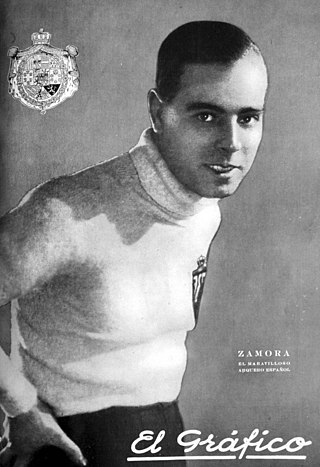
Ricardo Zamora Martínez was a Spanish footballer and manager. He played as a goalkeeper for, among others, RCD Espanyol, FC Barcelona and Real Madrid. As an international he played for both the Catalan XI and Spain. As a manager, he won two La Liga titles with Atlético Madrid and briefly managed Spain.

The Royal Spanish Football Federation is the governing body of football in Spain. Founded on 29 September 1913, it is based in La Ciudad del Fútbol of Las Rozas, a municipality near Madrid.

Francisco López Acebal was a Spanish novelist, playwright and journalist.

Enrique Díez-Canedo Reixa, was a Spanish postmodernist poet, translator and literary critic.
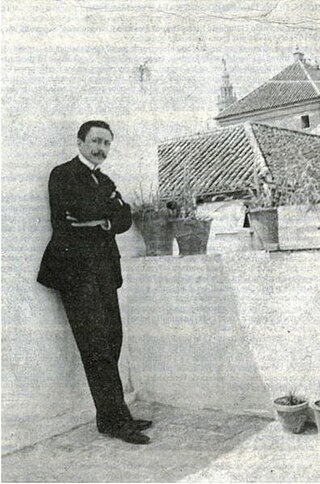
Nicolas Tenorio Cerero was a Spanish writer, historian, politician and judge.
Frederick A. de Armas is a literary scholar, critic and novelist who is Robert O. Anderson Distinguished Service Professor in Humanities at the University of Chicago.
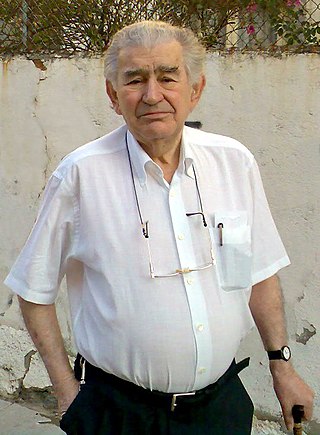
Antonio Gamoneda Lobón is a Spanish poet, winner of the Cervantes Prize in 2006.
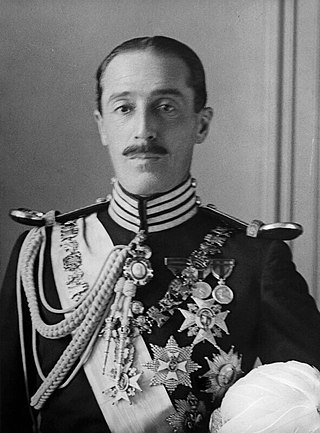
Jacobo Fitz-James Stuart y Falcó, 17th Duke of Alba, 10th Duke of Berwick, GE was a Spanish peer, diplomat, politician, art collector and Olympic medalist. He was one of the most important aristocrats of his time and held, among other titles, the dukedoms of Alba de Tormes and Berwick, the Countship of Lemos, Lerín, Montijo and the Marquessate of Carpio. He was granted the Order of the Golden Fleece of Spain in 1926.

María de la O Lejárraga García, usually known in Spanish under the pseudonym María Martínez Sierra was a Spanish feminist writer, dramatist, translator and politician. She collaborated with her husband Gregorio Martínez Sierra.

Micromanía is a Spanish computer game magazine. It was founded by the publisher HobbyPress, currently a subsidiary of Axel Springer SE. It was created in May 1985 and is one of the first magazines in Europe exclusively devoted to video games. It was first published soon after MicroHobby, which had been created just a few months earlier by the same publisher. The magazine in its two first periods was a major outlet supporting of the golden era of Spanish software. Micromanía celebrated its 25th anniversary in 2010. In July 2012, Axel Springer sold Micromanía to other owner, focussing its video game coverage in its other magazine, Hobby Consolas. Micromanía team continues the printed magazine independently, published by BlueOcean Publishing.
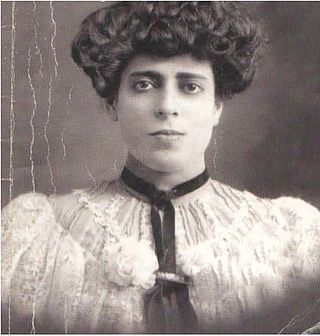
María Enriqueta Camarillo (1872–1968) was a Mexican poet-novelist, short story writer and translator. She was widely recognized for her works, with schools and libraries named after her, as well as a bust by Spanish sculptor Mariano Benlliure erected in Hidalgo Park in Mexico City in her honor. She received the 1923 literary prize from the Académie française for her novel El Secreto. She was awarded a collaborative partnership in 1927 with the Real Academia Hispano-Americana de Ciencias y Artes of Cádiz for her textbook Rosas de la Infancia. For the same work, she also received the prize for best children's literature from the Literary Salon of the Universal Exposition in Seville, Spain. Camarillo was granted the Order of Isabella the Catholic in 1947 and in 1948 received the Civil Order of Alfonso X, the Wise.

La Ilustración Española y Americana was a weekly Spanish magazine that was published from 1869 to 1921 on the 8th, 15th, 22nd and 30th of every month. It was also published biweekly.
Cinemanía is a monthly film magazine based in Madrid, Spain. It has been in circulation since 1995.

Francisco Darío Villanueva Prieto is a Spanish literary theorist and critic. He has been a member of the Royal Spanish Academy since 2007, and he occupies the chair corresponding to the letter D. Secretary of the Academy from December 2009, he was elected director in 2014, post he held until January 2019.

Jorge Enrique González Pacheco is an international award-winning Cuban poet, film industry professional, and cultural entrepreneur. He has a Bachelor's Degree in Latin American Literature from University of Havana, Cuba, and a Master's Degree in Hispanic Literature from Complutense University of Madrid, Spain.
Vértice was a monthly Falangist magazine published in San Sebastián, Spain, between 1937 and 1946. Its subtitle was Revista nacional de la Falange. From late 1937 it was changed to Revista nacional de Falange Española Tradicionalista y de las J.O.N.S. The magazine was one of the early propaganda publications which supported the rule of Francisco Franco.

Adolfo Clavarana y Garriga was a Spanish lawyer and Catholic propagandist.
















